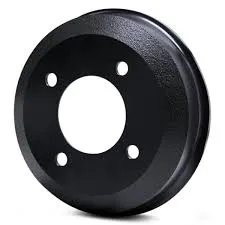Comparing Disc Brakes and Drum Brakes for Trailers Performance and Safety
Disc Brakes vs. Drum Brakes on Trailers A Comprehensive Comparison
When it comes to trailer braking systems, the debate between disc brakes and drum brakes is a hot topic among trailer owners, manufacturers, and enthusiasts. Each type of brake has its own advantages and disadvantages, making it crucial to understand their differences before making a decision. This article explores the features, benefits, and drawbacks of both braking systems, helping you choose the most suitable option for your trailer.
Understanding the Basics
Disc Brakes Disc brakes consist of a round disc or rotor attached to the wheel hub. When the brake pedal is pressed, hydraulic fluid pushes brake pads against the rotor, creating friction that slows the wheel. This design is prevalent in modern vehicles and is known for providing consistent performance across various conditions.
Drum Brakes On the other hand, drum brakes feature a cylindrical drum that rotates with the wheel. Brake shoes inside the drum expand when the brake pedal is applied, pressing against the drum's inner surface to create stopping power. Although drum brakes have been widely used for years, their design is somewhat outdated in comparison to disc brakes.
Performance
Stopping Power Disc brakes generally offer superior stopping power compared to drum brakes. They dissipate heat more effectively, reducing the risk of brake fade during heavy use. This makes them particularly advantageous for larger trailers or those towing heavy loads, where stopping power is crucial.
Heat Dissipation As mentioned, disc brakes excel at heat management. Their open design allows for better airflow, which keeps them cooler. Drum brakes, however, are enclosed and can retain heat, which may lead to brake fading, especially during prolonged braking scenarios.
Maintenance
Ease of Maintenance When it comes to maintenance, disc brakes are easier to service. Their components are more accessible, allowing for quicker inspection and replacement of parts like pads and rotors. In contrast, drum brakes can be labor-intensive to maintain, requiring more disassembly to access the brake shoes and drum.
disc brakes vs drum brakes on trailer

Durability Both braking systems have their durability aspects. Disc brakes typically have a longer lifespan because they are less susceptible to overheating. However, drum brakes can endure the test of time when properly maintained, making them a reliable choice for those who prefer low-maintenance solutions.
Weight and Cost
Weight Considerations Disc brakes tend to be lighter than drum brakes, which can be beneficial in maintaining the overall weight of the trailer. For weight-sensitive applications, such as lightweight trailers or those closely adhering to weight limits, this can be a significant factor.
Cost Implications When comparing cost, drum brakes usually come with a lower initial price. This can be appealing for budget-conscious trailer owners. However, when factoring in maintenance, replacement parts, and potential brake fade issues, disc brakes may prove to be more cost-effective over the lifespan of the trailer.
Safety
Safety Features Notably, the safety aspect is paramount when discussing trailer brakes. Disc brakes provide more reliable and consistent stopping, especially under adverse conditions. Their enhanced performance can be critical in emergency stop situations, making them a safer choice for those who frequently tow heavy loads or travel long distances.
Regulatory Compliance Additionally, some jurisdictions have specific regulations regarding the type of braking system required for heavier trailers. Understanding these regulations can guide your decision and ensure compliance, which is essential for safe towing.
Conclusion
In conclusion, the choice between disc brakes and drum brakes on trailers ultimately depends on your individual needs, usage patterns, and budget. Disc brakes offer superior performance, easier maintenance, and enhanced safety, making them ideal for heavy-duty applications. However, drum brakes can still serve well in lighter applications, offering a lower-cost alternative with reliable performance when adequately maintained. Consider your towing habits, the weight of your load, and your long-term maintenance preferences when making a decision, as this will help you choose the right brake system for your trailer.
-
Truck Drum Brake Spring Replacement ProcedureNewsAug.22,2025
-
Evolution Of Brake Drum Function Designs In Automotive HistoryNewsAug.22,2025
-
Drum Brake Motor Thermal Management SolutionsNewsAug.22,2025
-
Essential tools for brakes and drums repair jobsNewsAug.22,2025
-
Trailer Drum Brake Self-Adjusting Mechanisms ExplainedNewsAug.22,2025
-
Brake Drum Types in Vintage Auto RestorationNewsAug.22,2025
-
Rear Drum Brakes Maintenance TipsNewsAug.04,2025


